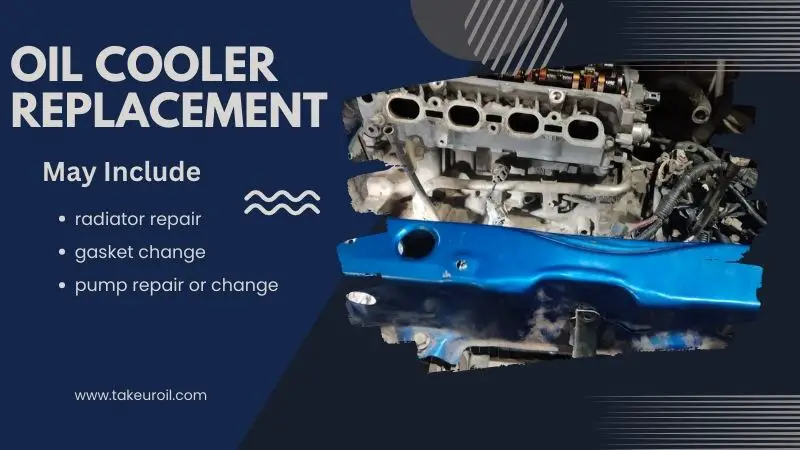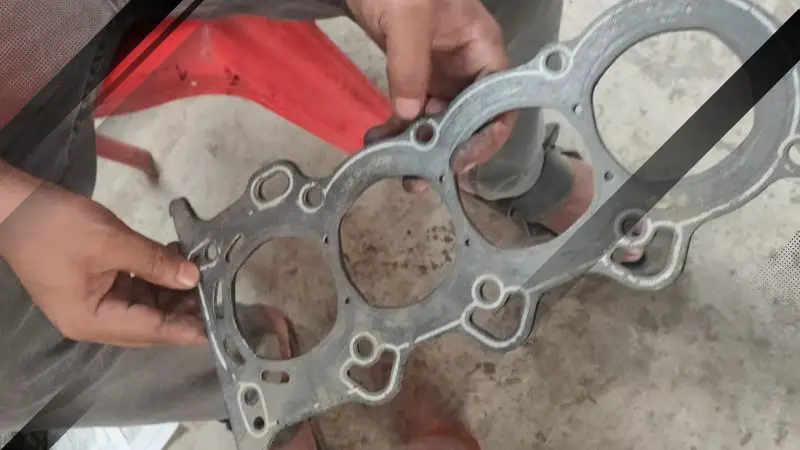Your mechanic just told you, your oil cooler needs to be replaced. Now you’re wondering, what is the average oil cooler replacement cost?
Usually, the engine oil cooler replacement cost is between $550 to $600. However, various factors come into play when it comes to replacements, such as the oil usage period, the type of issue, the cost of additional parts, etc.
Replacing an oil cooler isn’t the cheapest repair, but it’s also not the most expensive. The good news is if you catch it early, you can avoid further damage to your engine.
For further information, keep reading this article and gain some ideas on it.

What Is an Oil Cooler?
An oil cooler is a small radiator that helps lower the temperature of the engine oil in your vehicle.
The oil circulates through the oil cooler, which is typically located in front of the radiator. It allows the oil to release its heat before circulating back to the engine.
Without an oil cooler, the oil would get extremely hot, break down faster, and lose its ability to properly lubricate and protect your engine.
Overheating oil can lead to permanent engine damage, so an oil cooler is critical, especially for high-performance vehicles or in hot weather.
Common Symptoms of Oil Cooler Leak
If your oil cooler is on the fritz, you’ll notice some telltale signs. The oil cooler helps regulate the temperature of your engine oil, so problems with it can cause overheating and other issues.
Oil Leaking from Car
You may see oil leaking under your car. Not a lot, but enough to leave some spots in your driveway or garage. This usually means the oil cooler seal or gasket has gone bad and needs replacement.
An oil cooler leak can be dangerous if left unfixed. It allows contaminants into your engine oil and reduces the amount of oil in circulation.
In this case, you need an engine oil cooler gasket replacement. Parts cost on average $49.85 – $60.93, and services cost $276.12 – $337.48.
Engine Overheating
Your temperature gauge may start reading higher than normal, especially when idling or in heavy traffic.
The oil cooler helps cool the oil, so if it’s malfunctioning, your oil temperature will rise. Overheating oil can damage internal engine parts, so this symptom requires immediate attention.
Lower Engine Performance
You may notice a drop in oil pressure, rough engine performance, or strange noises coming from the engine. These can indicate sludge buildup or other problems resulting from a faulty oil cooler.
Smell of Burning Oil
Another symptom of an oil cooler leak is the distinct smell of burning oil. When the oil drips onto hot engine components or exhaust parts, it can create a noticeable odor.
This smell may enter the cabin through the air vents or become noticeable when you open the hood of the vehicle.
If your vehicle shows any of these symptoms, it’s best to have the oil cooler inspected and replaced as needed by a certified mechanic as soon as possible.
When Do You Need an Oil Cooler Replacement?
If your vehicle is showing any of the following symptoms, it’s probably time for an oil cooler replacement:
- Overheating Engine: The oil cooler helps regulate engine oil temperature. If it’s failing, your engine may start to overheat, especially when idling or in heavy traffic.
- Milky Oil: If there’s a crack in the oil cooler, coolant can seep in and contaminate the oil. Check your dipstick. If the oil looks milky or foamy, that’s a sign the oil cooler needs replacement.
- Oil Leaks: Look under your vehicle for any signs of oil spots or drips. An oil cooler leak will typically be located around the oil filter or oil pan.
- Check Engine Light: A faulty oil cooler can sometimes trigger the check engine light to come on. Have the code scanned to determine if it’s related to the oil cooler.

BAD OIL PAN GASKET
When Replacement is Critical
In some cases, an oil cooler replacement becomes critical to avoid permanent engine damage:
- If you notice coolant in your oil. This can damage internal engine components like bearings, pistons, and valves.
- When your oil pressure gauge is reading low, or the oil light comes on. This indicates the oil cooler may be severely restricted or plugged, starving your engine of oil.
- If your engine overheats frequently or runs hot all the time. Prolonged overheating can cause head gasket failure, cylinder head warping, and other catastrophic engine damage.
An oil cooler replacement may seem like an expensive repair, but neglecting the problem will only lead to costlier engine repairs down the road.
It’s best to have the oil cooler replaced as soon as any issues are detected to avoid risking permanent damage to your vehicle’s engine.
What is the Cost of Replacing an Oil Cooler
Replacing an oil cooler is typically not an inexpensive job. The exact cost will depend on the make, model, and year of your vehicle.
On average, you can expect to pay between $550 to $600 for an engine oil cooler replacement.
The average Ford 6.0 oil cooler replacement cost is about $200 to $500. This cost can vary greatly and has a lot to do with which replacement oil cooler you choose.
For your ease of understanding, here we will discuss oil replacement costs specifically:
- Labor costs are usually between $159 to $201. The time required can range from 1 to 8 hours depending on how difficult it is to access the oil cooler in your particular vehicle. More complex jobs with additional parts that need to be removed and reinstalled will be on the higher end of this range.
- The oil cooler unit itself typically costs $50 to $500. Prices vary depending on whether you need a basic cooler or a heavy-duty, high-performance model. OEM coolers from your vehicle manufacturer will usually be more expensive than aftermarket options.
- Additional parts like new oil, oil filter, hoses, clamps, seals, or gaskets will add to the total bill. Expect to pay $386 to $394 for these types of necessary extras.
- Many shops will also charge a diagnostic fee of $50 to $150 to inspect your vehicle, test the oil cooler and determine if replacement is needed. This fee is sometimes waived if you proceed with the recommended repair.
As your vehicle’s lifeblood, clean oil is essential for proper lubrication, cooling, and performance.
Replacing your oil cooler helps ensure maximum engine longevity and optimal efficiency, so the investment in this important service can be well worth the cost.
Why Oil Cooler Replacement Is Important
You already got an idea of the engine oil cooler replacement cost. But do you ever think, why is this so important for your vehicle? Let’s know about it.
Prevent Engine Damage
An oil cooler replacement is important to prevent serious damage to your engine. The oil cooler is responsible for regulating the temperature of the oil in your engine.
If it fails or leaks, the oil can overheat, which reduces its ability to lubricate and cool critical engine components. It can lead to permanent damage like warped or cracked heads, damaged pistons, and worn-out bearings.
Replacing a faulty oil cooler is much less expensive than an engine rebuild or replacement!
Improve Performance
A properly functioning oil cooler also helps your engine run at peak performance. When the oil is at the optimal temperature, it flows freely which reduces friction and allows all parts to move efficiently.
Your engine will run smoother, idle better, and have more power. If you’ve noticed your engine running rough, stalling, or lacking power, it could indicate a problem with the oil cooler.
Extend the Life of Your Vehicle
By preventing overheating and damage, an oil cooler replacement can help extend the overall lifespan of your vehicle.
The oil cooler is a relatively inexpensive part, but the costs associated with repairing or replacing an engine due to lack of lubrication or overheating can be staggering.
For the price of an oil cooler replacement, you’ll gain peace of mind knowing your engine is protected and will likely last for many more miles.
- Check your vehicle’s recommended service intervals for inspecting and replacing the oil cooler.
- Watch for signs like oil in the coolant, coolant in the oil, or oil on the ground under your vehicle which can indicate an oil cooler leak or failure.
- For the cost of an oil cooler replacement, you’ll save money in the long run through improved fuel economy, lower repair costs, and a longer-lasting vehicle.
An oil cooler replacement may not be the most exciting thing to spend money on. But it’s one of the most important things you can do to keep your engine running well for years to come. Think of it as an investment in your vehicle’s longevity and performance.
Frequently Asked Questions
When should I replace my oil cooler?
There are various symptoms you can find that indicate it’s time for oil replacement. Some of those symptoms are oil leaking, losing engine power, rising engine temperature, etc.
Can an engine oil cooler be repaired?
Yes, an engine oil cooler can be repaired depending on the type of oil cooler and the type of failure. Sometimes in a bad situation, a temporary repair can be made so that your machine can continue to work until a new cooler is supplied.
How long does it take to replace an oil cooler?
Usually, the oil cooler is buried under the intake manifold, turbocharger, and oil filter housing. So it requires around 8 hours of normal labor time to fix it.
What is the cost of an oil cooler replacement chevy cruze?
The average cost to replace a Chevrolet Cruze engine oil cooler is between $347 and $395. Labor costs are estimated to be between $185 and $233 while additional parts costs are between $162 and $162.
Can you drive with a leaking oil cooler?
It can be so dangerous to drive with a leaking oil cooler. It is important to remember that once oil reaches a certain temperature, it can become flammable. So, it’s not recommended to drive with a leaking oil cooler.
Final Thought
As you’ve learned, an oil cooler is a vital part of your vehicle’s engine, and replacing it when needed is important to keep your car running well.
While the cost can vary depending on your specific vehicle and mechanic, you now have a good sense of what to expect to budget for this repair.
When those warning signs pop up that your oil cooler may be failing, don’t delay in getting it checked out.
An investment in a fully functioning oil cooler replacement will help ensure your faithful vehicle companion stays with you for the long haul.
Hopefully, this small effort will be helpful for all of you to know the engine oil cooler replacement cost and everything related to it. Thank you all for reading this article.
Read Also:
Oil In Intercooler Pipe: What’s The Reasons And Solution

